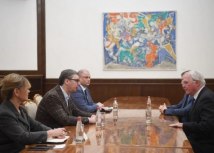Serbia backtracks on media reform pledges
Optimism about reform under the new government fades as the new team delays enacting the promised media strategy and takes effective control of the media through the familiar tactics of targeted advertising and hidden ownership.
Bojana Barlovac, BIRNWhen the new coalition government took power in Serbia in July 2012, it promised to create a freer media scene than had been the case under the previous Democratic Party-led administration.
Since then, initial optimism about this greater freedom has started to crumble.
Under EU pressure, Serbia adopted a long-awaited media strategy in September 2011 - but the government is already running late with its implementation.
New media laws have been drafted in line with the strategy and with EU standards. But the Culture Ministry changed the draft public information law at the last moment, raising concerns about what version of the law will be adopted.
Meanwhile, the fate of Serbia’s public service broadcaster, RTS, also remains unclear.
There are indications that the troubled broadcaster may now be financed from the state budget in future, instead of from subscription fees, for example.
The ruling Serbian Progressive Party also appears to have quickly learnt lessons from its predecessors, the (now in opposition) Democratic Party, who gained effective control of almost all the media through advertising or hidden ownership structures.
One by one, the Progressives have taken over media outlets, with just a couple still struggling to remain loyal to the Democrats.
Strategy on hold
Dragan Kolarević, the Deputy Culture Minister, on June 13 said the ministry would send a draft law on public information to the government early in July.
It is running late. The law is part of a set of media laws that the media strategy obliged Serbia to adopt by March 31.
Vukašin Obradović, president of the journalists’ association, NUNS, said that Serbia was still way behind deadline, as parliament cannot adopt the law until September at the earliest.
“Maintaining such a situation, delaying media reform, will result in the survival only of the state and church media, because they are the only ones with a stable source of funding,” Obradovic told BIRN.
It all started more encouragingly. After Brussels placed media reform on the agenda of all Balkan would-be member states, Serbia drew up and adopted its media strategy in September 2011.
Experts saw the strategy, covering the period up until 2016, as a solid basis for regulating the chaotic-looking media scene in the country.
“We have been awaiting such a strategy for more than ten years,” Veran Matić, editor-in-chief of the broadcaster B92 told BIRN.
The new government, formed last May, meanwhile promised fresh legislation guaranteeing freedom of the media as well as action on the strategy.
A working group formed from the Culture Ministry and academia started drafting a law on public information last November. Under EU pressure, members of media associations also joined the working group.
Ivan Cvejić, editor-in-chief of Beta news agency, said the drafting of the law was marked by a spirit of unity among media and journalists’ associations that had never been seen in Serbia.
The draft law, which was presented for public debate in March, envisions the withdrawal of the state from the media and an end to direct budget funding for local media - in line with the strategy.
However, Zoran Sekulić, director of Fonet news agency, an observer in the working group on the law, recalls that two months after the public debate on the law finished, the Culture Ministry presented another version of the law at a meeting on June 3.
That version has not yet been made public. However, Sekulic says the new version of the law is not in line with the strategy.
Key changes apparently include extending the deadline for state withdrawal from the media. “Instead of withdrawing by the end of 2014, the state media will only have to call a tender for the sale (of the outlets) in 2014,” Sekulic told BIRN.
Matić of B92 says Serbia has unnecessarily delayed opportunities to bring in the new media laws.
“This will have significant repercussions on the media scene and its actors,” he told BIRN, voicing fears that privatization and the withdrawal of the state from media ownership “presumably will not be done in the right way next year either”.
Meanwhile, the Ministry has also drafted a law on electronic media and the public debate is expected to start on it in mid-July.
Hope invested in EU
Experts hope that the EU, which has played an important role in the Serbian media scene by pushing reforms, will continue exerting pressure on the government to adopt laws in line with the EU standards.
Matić says that the EU’s proactive approach is continuing through monitoring of the development of media laws, the engagement of experts who analyse proposed legal texts and providing suggestions for improving draft laws.
Cvejic also praised the EU’s financial help in the media field. “We should not ignore the financial support of the EU and its member states to the Serbian media, through a number of tenders and projects, enforcing to some extent the media not to forget some important social issues due to the crisis,” Cvejic says.
New editorial policies
In order to roll back the influence of the Democrats on the media scene, the Progressives have either forced hidden owners – usually from the ranks of the Democrats - to withdraw, or have used public companies ever shrinking advertising budgets to punish critical voices.
A senior official of the Progressive is meanwhile soon expected to win rights to a national TV frequency, while leaked documents from the secret services and top officials discrediting the government’s political opponents flood the tabloids.
The Progressives have taken over the editorial policy of Novi Sad-based daily paper Dnevnik, which is half-owned by the state, as they were not satisfied with the newspaper’s reporting on Progressive-led protests against the Vojvodina provincial government in April. (The Progressives hold in power in Novi Sad city but the Vojvodina government is still led by the Democrats.) The Vojvodina journalists’ association, NDNV, has condemned the apparent take-over of Dnevnik.
Press, a newspaper with an unclear ownership structure, but which was seen as pro-Democrat, lost its print edition on November 15 2012 after Miroslav Mišković, a tycoon linked to the Democrats, was forced to admit that he was a co-owner.
Lack of transparent ownership has been a major issue in the Serbian media scene for years.
Serbia’s oldest daily paper, Politika, is another media outlet whose ownership came under the spotlight recently.
Critics of the government say the government has tried to take complete control of the newspaper in order to exclude the Democrats from having any possible influence over it.
Politika is half-owned by the state and half by the Moscow-based OOO East Media Group led by Miroslav Bogićević, who helped finance the Democrats while they were in power.
Over the summer of 2012 the Progressives accused the Democrats of controlling and using the paper for their own promotion. BIRN has learned from Politika’s management that tensions have eased after Bogicevic recently agreed not to interfere in editorial policy, following pressure of the Progressives. On June 17, Ljiljana Smajlović was appointed new editor-in-chief of Politika.
The premises of the defunct TV station, Avala, meanwhile, are now busy again as a new TV station, Sky Info Plus, moves in. The station is soon due to apply for the national frequency of Avala, a source in the team told Balkan Insight. According to the same source, the editor-in-chief will be coming from the Progressive Party’s main board.
The ruling coalition seems also to have managed to obtain influence over the editorial policy of Serbia’s best-selling daily paper Blic, owned by a joint venture between Swiss Ringier AG and German Axel Springer AG.
During the election campaign in spring 2012, Blic’s cover pages became synonymous among media watchers for sycophantic praise of the then ruling Democrats.
But a journalist from Blic told BIRN that after new government took office, Blic was threatened with the potential loss of key advertisers: public enterprises and ministries.
“Soon after, we shifted our editorial policy by softening our stance towards the Progressives,” the journalist explained.
“When I once proposed to do an investigative piece related to the ruling party official I was explicitly told not to,” the same journalist noted.
In addition, the tabloids Informer and Kurir regularly publish scandals and affairs based on leaked information sourced from the new centre of power.
For weeks, their target was the Mayor of Belgrade, Dragan Đilas, leader of the Democrats. Their current target is Mlađan Dinkić, the finance minister, who has disagreed with the Progressives on the economic measures that need to be taken.
Future of RTS
Last autumn, the face of Aleksandar Tijanić, the director general of public service broadcaster, RTS, graced the pages of almost every issue of Kurir, which started calling for Tijanić’s resignation after President Tomislav Nikolic, a member of the Progressives, urged him to resign on October 7.
Since Tijanić has succeeded in keeping his position, due to complicated legal procedures surrounding his potential dismissal, the government found another way to assume the reins in RTS.
Aleksandar Vučić, Deputy Prime Minister, has said that RTS and the public broadcaster in Vojvodina, RTV, will be funded from the budget instead from subscription fees, indicating increased political control over them.
Media experts and associations have voiced strong opposition to the move. Vukašin Obradović, president of NUNS, said that such a change would open a Pandora’s box.
Shifting to budget funding also undermined the concept of state withdrawal from the media and switching to a project-finance model, which is what the media startegy envisions, he noted.
Meanwhile, employees at RTS have not been paid for months and the number of people paying the subscription fee is still decreasing. According to latest data, only 30 per cent of people in Serbia have been paying their TV licence fee of 5 euro a month, prompting Tijanić to seek financial help from the government.
Now all eyes are on the EU delegation in Serbia not to allow the government to proceed with media laws that are not in line with the EU-backed media strategy. State withdrawal from media ownership and the independence of public broadcaster are the key issues that need to be addressed.
“The media strategy is the basic document and we will not allow the government to circumvent its guidelines,” a Brussels diplomat told BIRN.



